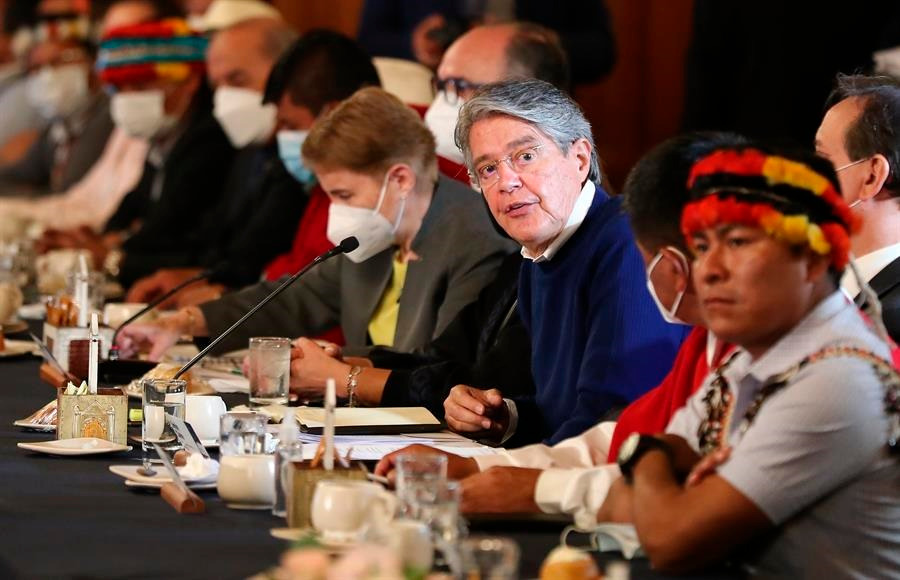
President Guillermo Lasso and Conaie representatives met at a dialogue table on Monday, October 4. Photo: EFE / José Jacome
By María Josefina Arce
Ecuador's government has not shown willingness to provide a solution to the demands of the people. Pressured by the protests that have taken place only four months after assuming the presidency, Guillermo Lasso met with representatives of CONAIE, Confederation of Indigenous Nationalities, but there were no concrete results.
No response was given to the issues presented and that today concern many sectors of society, especially the most vulnerable who saw their living conditions worsen in the four years of management of the now former president Lenin Moreno and the arrival of COVID 19.
The outlook doesn't look good at all. In the few months he has been at the helm of the country, Lasso has continued the neoliberal policies of his predecessor. The president did not listen to the demand expressed by the participants in the dialogue of the need to eliminate three decrees approved in 2020 by Moreno regarding fuels.
At the end of the meeting, Leonidas Iza, president of CONAIE, pointed out that there was no openness from the president about the provisions that are increasing fuel prices every month, with the usual consequences for the population.
Nor was any progress made with respect to other problems such as labor flexibilization, contained in the draft Law for the Creation of Opportunities, presented by the authorities, which will lead to insecurity and lack of guarantees for workers.
Union leaders have pointed out that the precariousness of employment does not solve the problem of unemployment, which today affects more than 5% of the economically active population, especially women.
There were no concrete answers to the demand for fair prices for agricultural products and the restructuring of the bank debts of some four million Ecuadorians.
Another issue of interest is the handing over of territories of great biodiversity to transnational capital for mining and oil exploitation, activities that inevitably produce ecological degradation, the dispossession of indigenous and peasant communities from their lands and the violation of their human rights.
The ecological and health damages caused by these extractive actions are more than proven. Oil spills contaminate rivers and lakes, kill the local flora and fauna and cause various diseases in the inhabitants of the area.
The case of the U.S. oil company TEXACO, later acquired by CHEVRON, which caused an ecological and humanitarian disaster in Ecuador, is well known. During its operations, the transnational company dumped 650,000 barrels of crude oil and more than 16 billion gallons of wastewater into the rivers and soils of the Amazon jungle, affecting the health and way of life of more than 30,000 indigenous people and peasants.
Two thousand people have died of cancer due to toxic gases and water and air pollution.
In the face of all these problems that directly affect the population and especially the most vulnerable sectors, the president did not provide solutions. It was a dialogue that did not produce any concrete results and only showed that the government's interests are on one side and those of the citizens on the other.

